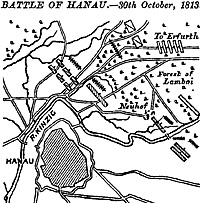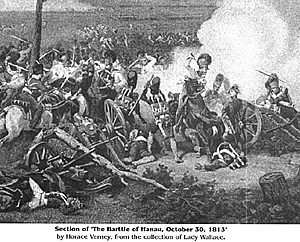 A more legitimate artillery achievement which we shall take from the wars of this epoch forms the chief interest of the battle of Hanau, an action which is memorable because it was the last of the vast succession fought in Germany during the wars which succeeded the French revolution.
A more legitimate artillery achievement which we shall take from the wars of this epoch forms the chief interest of the battle of Hanau, an action which is memorable because it was the last of the vast succession fought in Germany during the wars which succeeded the French revolution.
Napoleon having been defeated by the Allies at Leipzig in the autumn of 1813, was hurrying, with the remains of his shattered army, to the French frontier. The Bavarians, encouraged by the prospect of freeing Europe from the heavy hand of the tyrant, opened up by the strong coalition which had declared against him, suddenly deserted his banners, joined the Allies on the 8th of October, and now stood as enemies across his line of retreat homewards. On the 29th of October Marshal Wrede had taken position in the forest of Hanau, stationing his troops across the great road to Mayence, and thus effectually blocking the French line of retreat. The force under his command numbered some 50,000 men.
Napoleon, who had left Erfurth with 90,000 men, had lost so many men on the road, owing to straggling, sickness, and the other causes which ever attend the retreat by forced marches of an army more or less demoralised by defeat, and suffering considerably from the privations incidental to it, that he now found himself with even nominally but 80,000 men, and of these 30,000 had dropped so far back along the road that they were not available to take part in the fighting which was imminent. He had lost heavily in artillery, too, during his recent reverses, and his magnificent force of 1300 guns had how become reduced to 200. The majority of these, however, belonged to the Guard, and were equal to any in Europe.
The forces available on either side were therefore not unequally matched. For whatever want of morale may have existed in the French ranks was counteracted by the knowledge that they were fighting to gain their road home, and that they must break their way through their enemy or perish.
The Emperor no sooner heard that the Bavarians blocked his path than he made dispositions to attack. The allied army stood in front of Hanau, the right wing resting on the Kinzig, the left in echelon on the road from Erfurth to Frankfort. Their centre was garnished with a mass of 60 powerful guns, which were placed so as to sweep the line of advance of the French as they debouched from the forest. Thus it seemed that the feat of Moreau at Hohenlinden might be repeated, and if Wrede were strong enough to prevent his opponents from deploying as they emerged from the issues of the wood, he might emulate the achievement of the great soldier who had just fallen at Dresden. But the conditions were scarcely similar, even leaving out of sight the fact that the resources of a brilliant military genius had to be reckoned with.
The corps of Victor and MacDonald, pushing the advanced light troops of the Bavarians with some difficulty through the wood before them, at length gained a footing beyond the trees and endeavoured to deploy. They had suffered heavily in the recent disastrous engagements in which they had taken part, and weary and dispirited as they were they now came under a most trying cannonade from the great mass of guns which stood before the allied line, and which poured a heavy concentrated fire upon them.
 For four hours the French army was unable to make any way across the narrow plain
which lay between the forest and the banks of Kinzig. Napoleon's anxiety for the safety of his line of retreat grew as the hours went by. Finally he sent the trusty Druot, who had served him so well at Wagram and Leutzen with his artillery, to examine the enemy's position, and he returned to say that with 50 guns and two battalions of the Guard he would engage to force a passage.
For four hours the French army was unable to make any way across the narrow plain
which lay between the forest and the banks of Kinzig. Napoleon's anxiety for the safety of his line of retreat grew as the hours went by. Finally he sent the trusty Druot, who had served him so well at Wagram and Leutzen with his artillery, to examine the enemy's position, and he returned to say that with 50 guns and two battalions of the Guard he would engage to force a passage.
The "Immortals," [5] as the rest of the army termed them, had suffered less than the other troops during the late battles, and was still comparatively intact and in good heart. The Emperor yielded to his suggestions. Two battalions of the Guard which
had just come up were sent forward in skirmishing order, and succeeded in clearing the enemy's tirailleurs from the outlets of the forests and the little plain beyond. In their wake Druot, led forward his great battery.
He first brought but 15 guns into action, but gradually added to their number until all his force was deployed. The Artillery of the Guard was, as we have said, splendidly equipped and trained, and their well served fire, directed by an exceptionally able leader, soon got the better of the guns which opposed them, and in a little while established a marked superiority over them in spite of the preponderance in numbers which they possessed.
Then Nansouty and Sebastiani debouched with the cavalry of the Guard under cover of their fire, and launched their squadrons, which were also comparatively little the worse for their recent experiences, upon the enemy. These justly dreaded horsemen swept away all in their immediate
front, and when Wrede threw some of his force into squares and tried to reorganise his cavalry in the rear for another effort, Druot's irresistable batteries were again ready to paralyse all their efforts to rally, and the Russian cavalry, which attempted to come to the support of the
infantry, were as little able to withstand the French Curassiers as they had been. Finally the whole left wing of the Allies gave way entirely and fled headlong towards the Kinzig, leaving the path of escape open to the French.
The Bavarian General made a last and despairing effort on his right, but two battalions of the old Guard were available to be sent against him, and were strong enough to bring his advance to a stand-still. Finally Wrede was compelled to give up all hope of cutting off his great antagonist, and was glad to find security for his shattered army under the cannon of Hanau.
Thus a General who appreciated the power of artillery was able once more to bring victory round to his side by a judicious yet bold handling of the arm, and Hanau undoubtedly may be quoted to illustrate what guns thrown with prompt decision into the battle are capable of effecting.
[1] Sometimes spoken of as Gross Gurschen.
More Achievements of Field Artillery Part II
Achievements of Field Artillery The Era of Napoleon: Part I
FOOTNOTES
[2] Taubert quotes the following instance of the great effect of canister on attacking troops from this battle: "A single 6-pr. which had been upset, and had to be righted before it could follow the battery, was attacked by the French hussars. The non-commissioned officer in charge put a round of canister over the ball already in the piece, and fired with such effect as to completely disperse the hussars who had come up quite close to the gun. Nor did an infantry column which advanced on it at the same moment fare better, although they had looked on the piece, which was almost abandoned, as an easy prize."
[3] Precis de l'art de la guerre.
[4] "Recuelides plans de combats et de batailles ilvrees par Vannee Frussienne, 1813-1815."
[5] Because the Emperor towards the close of his career was extremely chary of putting them into action.
Back to Age of Napoleon 30 Table of Contents
Back to Age of Napoleon List of Issues
Back to MagWeb Master List of Magazines
© Copyright 1999 by Partizan Press.
This article appears in MagWeb (Magazine Web) on the Internet World Wide Web.
Other military history articles and gaming articles are available at http://www.magweb.com